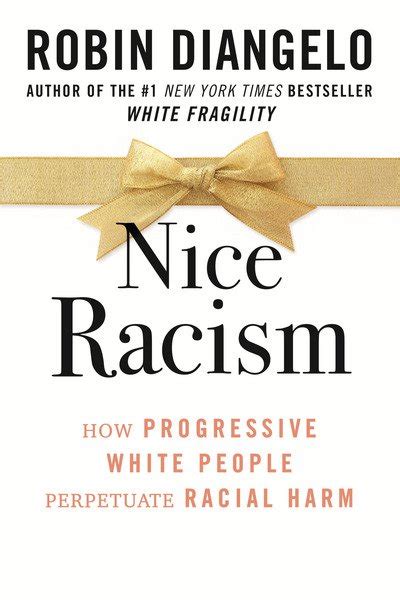Matt Taibbi reviews Robin DiAngelo’s Nice Racism: How Progressive White People Perpetuate Racial Harm.
Nice Racism, the booklike product just released by the “Vanilla Ice of Antiracism“, Robin DiAngelo, begins with an anecdote from the author’s past. She’s in college, gone out to a dinner party with her partner, where she discovers the other couple is, gasp, black. “I was excited and felt an immediate need to let them know I was not racist,” she explains, adding: “I proceeded to spend the evening telling them how racist my family was. I shared every racist joke, story, and comment I could remember my family ever making …”
Predictably, her behavior makes the couple uncomfortable, but, “I obliviously plowed ahead, ignoring their signals. I was having a great time regaling them with these anecdotes — the proverbial life of the party!” She goes on:
My progressive credentials were impeccable: I was a minority myself — a woman in a committed relationship with another woman … I knew how to talk about patriarchy and heterosexism. I was a cool white progressive, not an ignorant racist. Of course, what I was actually demonstrating was how completely oblivious I was.
No kidding. Instead of trying to amp down her racial anxiety out of basic decency, this author fed hers steroids and protein shakes, growing it to brontosaurus size before dressing it in neon diapers and parading it across America for years in a juggernaut of cringe that’s already secured a place as one of the great carnival grifts of all time. Nice Racism, the rare book that’s unreadable and morally disgusting but somehow also important, is the latest stop on the tour.
DiAngelo is a unique writer, being dishonest, dangerous, and moronic in magnificent quantities, probably in that order. If you’re trying, which she clearly isn’t, a good trade rule is, “If you’ve already written a book once, don’t write it again.” Nice Racism is the same book as the 2018 bestseller White Fragility, and by “the same” I don’t mean generally, but word-for-word, line-by-line, chapter-by-chapter the same, a thunderous, admirably brazen exercise in self-plagiarism. Can you guess which of these passages is from Nice Racism, and which from White Fragility?
a) Individualism… allows white people to exempt ourselves personally from race-based advantage.
b) To challenge the ideologies of racism such as individualism and color blindness, we as white people must suspend our perception of ourselves as unique and/or outside race.
c) Exploring our collective racial identity interrupts a key privilege of dominance — the ability to see oneself only as an individual.
d) We need to discuss white people as a group — even if doing so jars us — in order to disrupt our unracialized identities … Talking about race and racism in general terms such as white people is constructive for whites because it interrupts individualism.
The first is from Nice Racism, the rest from White Fragility. The last three actually comprise a paragraph that moves in full circle: “To challenge individualism, we must suspend individual perceptions by exploring our collective racial identity, which is good because by disrupting individual identities, we challenge individualism.” A rhetorical palindrome! This isn’t writing, but vomiting up mounds of sentences that mean the same thing and mopping them on the page. Because this author only has two or three ideas — I was going to make a list but I think it stops after “denying racism is evidence of racism” — the effect is disorienting across one book, let alone two.
H/T to K.T. at Ace of Spades H.Q. for the link.







